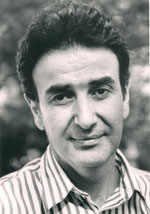Lawrence Joseph
Three poems
The Bronze-Green Gold-Green Foreground
The bronze-green gold-green foreground:
what can only be said in that language,
opaque, though clear, painted language.
The shy and green one, the most beautiful
one, the intensest one, on my mind,
opening, opened, in me...The reflection
(and, or, the refraction) of a reflection:
in light of that, light in secret...
(Tableaux: “Ancient Back Streets One November
Late Friday Afternoon”... “The Eyes the Sky’s Blue”...)
Those places where the narratives began... there,
too, in the rain. The code changed again.
On That Side
April and May. There, very near,
dimensions imploded —
the point, the line, the surface.
The arrangement of power, the immanence
of the pressure. “What,”
he said with a laugh, “you think I’m exaggerating?”
I can’t say that I’ve internalized it all yet.
I’m over on the other side —
Green Dolphin Street, the bar and café, that is,
a table in back, in the garden, engaged
in an act of asceticism.
A memory — so vivid, I close my eyes.
The Pattern-Parallel Map Or Graph
The sky? — ultramarine, tinted black, lines
of black ink. Newspapers, mud, fishtails,
betel nuts, trampled on along Canal Street.
Luck turns out hot. Eros is extraordinarily
lucky to have found Psyche. According
to the story, which is taken from Apuleius,
Eros’s and Psyche’s bodies are wet and hot.
Nine years — where does that take us
on the pattern-parallel map or graph?
Nine years from two thousand — nineteen ninety-one. . .
Wallace Stevens — him again —
in his commonplace book,
an entry made in nineteen thirty-four:
‘‘Ananke is necessity or fate personified,
the saeva Necessitas of Horace
Odes Book I No. 35, to Fortune. . .”
I’m the one who hears it. Chromatically
suspended, as the notes feel their way
from intervals to motifs, a progression
in a manner that disguises the key —
a linear polyphony forming harmonies in strange
developments. All kinds of different stuff, mixed
and fused, is where it’s at, chunks of vibrato. . .
Simultaneity requires the use of a topological
logic. Time compressed — interactivity escalated
to maximum speed. Why not? Have their official
status changed from human to animal, they live like
animals already. Once they’ve attained animal status
dozens of groups will come forward to defend them.
What, let’s say, in twelve years
will the zone of suffering that exists
outside the established orders look like? There’s
Venus again, moving across the sun,
in a mini-eclipse visible twice every century or so.
There’s the achieved conception, a God
accessible and inaccessible, merciful
and just, human and divine, completed
not far from the Black Sea. That mood,
intensely subjective, scenes and myths
reemerged. There, on the table, a flower the yellow
of flax closes, the irises unfolding,
two of them deep blue-purple, a third is larger,
and china blue. There, small, bright birds
in wooden cages in a store on East Broadway,
an illuminated scroll unrolled on the counter.

Lawrence Joseph, photo by Robert Buchta
Lawrence Joseph was born in Detroit. He was educated at the University of Michigan, Cambridge University, and the University of Michigan Law School. He is the author of five books of poems, most recently Into It and Codes, Precepts, Biases, and Tavoos: Poems 1973–1993, both of which appear from from Farrar, Straus and Giroux in September 2005. He also is the author of Lawyerland, a book of prose, from Farrrar, Straus and Giroux. A Professor of Law at St. John’s University School of Law, he is married to the painter Nancy Van Goethem, and lives in New York City.
it is made available here without charge for personal use only, and it may not be
stored, displayed, published, reproduced, or used for any other purpose
This material is copyright © Lawrence Joseph and Jacket magazine 2005
The Internet address of this page is
http://jacketmagazine.com/28/joseph-l-3p.html
